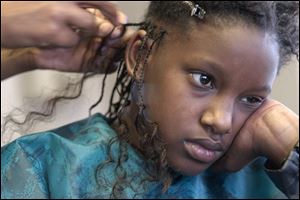
Hair braiders in a twist
10/20/2003
Michelle Holmes, 9, waits patiently as Lashawnda Horton braids her hair at Divas and Gents on Lagrange Street.
It is a skill daughters often learn from their mothers or an older sibling, then practice on their girlfriends.
Those who become good at braiding hair often continue to do it as a favor for siblings and friends. Some are good enough that they do it for others for pay.
In Ohio, Michigan, and other states, those who braid or style hair for money must become licensed by the state because of public health and other concerns.
Two Toledo women are among several statewide who have been sued by the Ohio Board of Cosmetology for performing African-style hair braiding without a license. The board has asked for permanent injunctions in Lucas County Common Pleas Court against Khadidja Wele and Awa Cisse.
According to court documents, Ms. Wele and Ms. Cisse were discovered braiding hair for clients last year in their homes. The two women signed agreements with the board to comply with state licensing requirements.
At the time, Ms. Awa, who was doing business as African Hair Braiding, lived in the 2100 block of Collingwood Boulevard. Ms. Cisse lived in the 4100 block of Secor Road, and went by Amy's African Hair.
James Rough, executive director of the state Board of Cosmetology, said legal action was taken because the women continued to braid hair for customers without complying with training and licensing requirements. He said his agency also filed requests for permanent injunctions against unlicensed hair braiders in Franklin, Cuyahoga, and Hamilton counties,
In Ohio, cosmetologists are required to have 1,500 hours of training at one of the 150 private or vocational schools in Ohio and pass a state test
However, a license for natural hair styling, which includes braiding, weaving, and extensions, can be obtained by taking 450 hours and passing the board exam.
The board can waive the class instructions for cosmetologists licensed in another state or if the applicants practiced the profession in another country for at least two years. They still must pass the test.
Michigan requires 400 hours of instruction at a cosmetology school and passing a test for those who want to be called a natural hair culturist. A license is not required for a person engaged in the activity as part of the practice of a recognized religion.
Mr. Rough said unlicensed hair braiders are not schooled on health, safety, and sanitation issues of cosmetology, and pose a risk to themselves and their customers.
“We are trying to get their attention that they are working illegally. I think a lot of them resent the fact they need a license,” Mr. Rough said.
Ms. Cisse and Ms. Wele could not be reached for comment.
Taalib-Din Abdul Uqdah of the American Hairbraiders & Natural Hair Care Association said regulating hair braiding is less about sanitation and public safety, and more about money, race, politics, control, and power.
“The law itself is racist on its face. The process of braiding, twisting, and locking hair has been a part of the African-American culture for centuries. Enacting any law that would prevent an individual from earning a living by doing a cultural practice is racist and unconstitutional,” said Mr. Uqdah, owner of a salon in Washington.
But Lashawnda Horton, a licensed cosmetologist who works at a North Toledo salon, said unlicensed braiders are taking money out of her pocket. “It is really not fair for us who went to cosmetology school. They are taking away our business. I think I would be more busy if people were not working on it in their homes,” said Ms. Horton.
Ms. Horton's salon, Divas and Gents on Lagrange Street, offers a full range of treatments including locks, braids, and weaves. An average appointment costs about $35 an hour.
Mr. Udaq said many cosmetology schools don't offer classes in hair braiding, and that could be a hardship for those who must travel to another city for certification.
Locally, the Toledo Academy of Beauty Culture, which operates three schools, does not offer classes in African hair-braiding. Leonard Rosenburg, owner and president, said there's not enough interest in the classes to make it economically feasible. “The demand isn't there that would warrant a separate teacher or space at my schools,” he said.